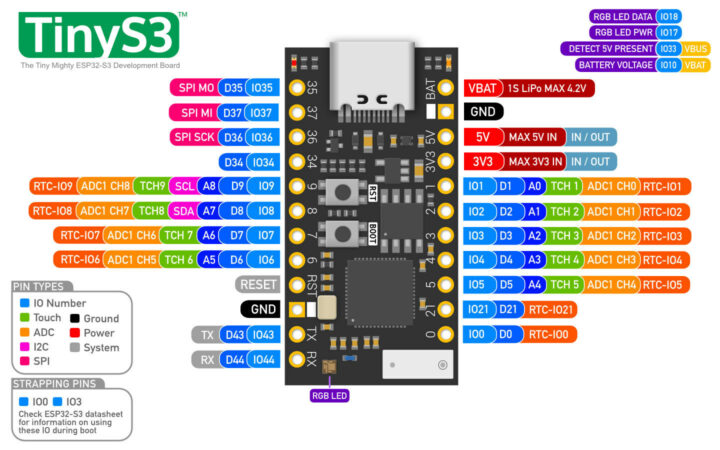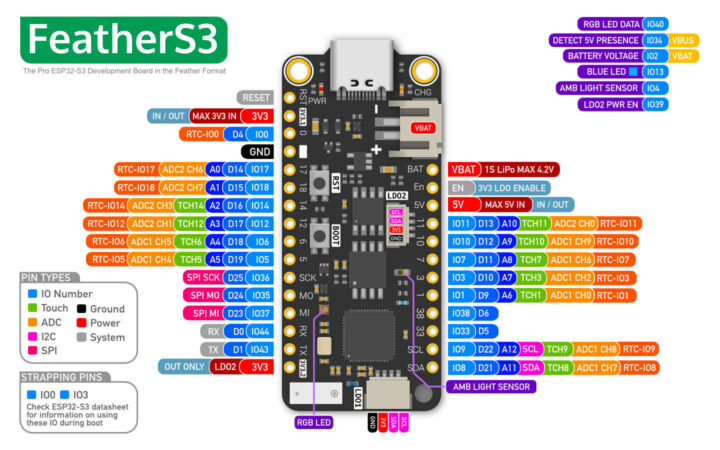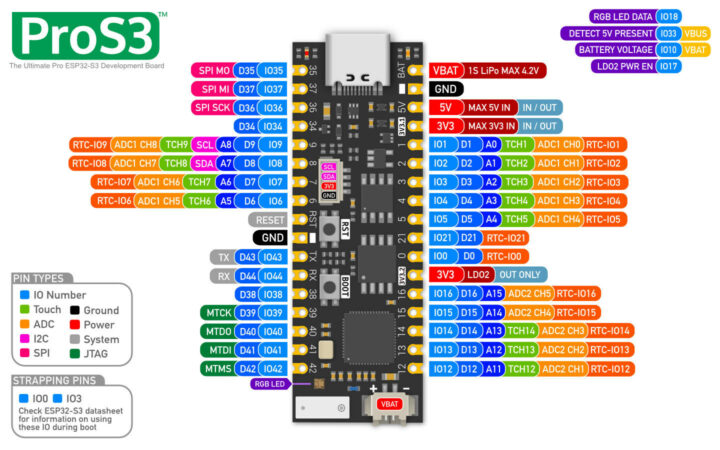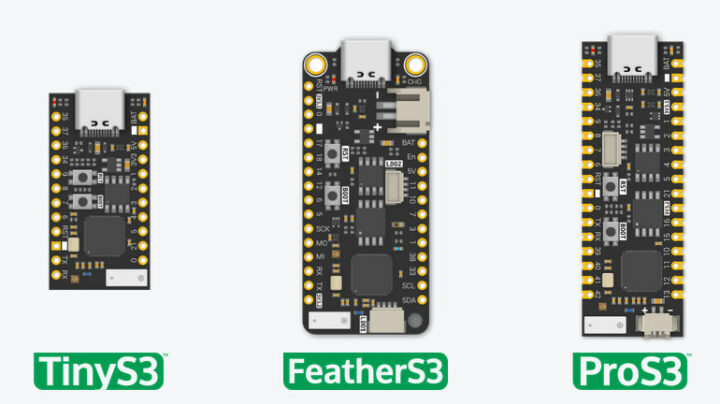Seon Rozenblum, better known as Unexpected Maker, has launched upgrades to its ESP32-S2 boards such as the TinyS2 with ESP32-S3 variants, namely TinyS3, FeatherS3, and ProS3 boards.
The new boards share the same form factors as the TinyS2, FeatherS2, and ProS2, but they get a more powerful dual-core microcontroller with AI instructions and 512kB SRAM. The microcontroller also adds Bluetooth 5.0 Low Energy (BLE) connectivity with Bluetooth Mesh support, instead of just WiFi 4 connectivity found in the earlier boards.
TinyS3, FeatherS3, and ProS3 boards share the following features:
- SoC – Espressif Systems’ ESP32-S3 with
- Dual-core 32bit Xtensa LX7 microcontroller up to 240MHz
- RISC-V ULP Co-processor
- 512KB SRAM
- 2.4GHz Wifi 4 (802.11b/g/n)
- Bluetooth 5.0 BLE + Mesh
- Memory – 8MB QSPI PSRAM
- Flash – 8MB to 16MB depending on the model.
- USB – 1x USB Type-C connector with reverse back-feed protection for power and programming
- Antenna – 3D high gain antenna
- Debugging – USB serial JTAG
- Misc – RGB LED
- Power Supply
- LiPo battery charging
- VBAT and 5V sense pins
But the boards differ in terms of form factors, available GPIO, flash capacity, and more as shown in the table below
| TinyS3 | FeatherS3 | ProS3 | |
|---|---|---|---|
| MCU | ESP32-S3FN8 | ESP32-S3 | ESP32-S3 |
| Flash | 8MB (Internal) | 16MB (External) | 16MB (External) |
| PSRAM | 8MB (External) | 8MB (External) | 8MB (External) |
| GPIO | 17 | 21 | 27 |
| 3V3 LDO regulator | 1 | 2 | 2 |
| STEMMA QT | N/A | 2x, one on each LDO | 1x on LDO 1 |
| Battery connection | Header + JST Pads on bottom | Header + JST PH on top | Header + Microblade on top |
| JTAG | USB serial JTAG | USB serial JTAG | USB serial JTAG + header pins |
| ESD protection | N/A | N/A | Yes |
| Castellated headers | N/A | N/A | Yes |
| Dimensions | 35mm x 17.8mm | 52.3mm x 22.9mm | 53mm x 17.8mm |
TinyS3 is the smallest of the lot, and leverages ESP32-S3FN8 chip’s embedded 8MB flash to save board space and maintain compatibility with the TinyPICO board.

The FeatherS3 is the successor of the FeatherS2, and, as you may have guessed from the board’s name, is compatible with the Adafruit Feather form factor. There are two LDOs. The second LDO is user controlled & auto-shuts down in deep sleep mode.

The ProS3 is the most advanced ESP32-S3 board from Unexpected Maker, who says it is like “the TinyS3 but on steroids” with more I/Os, a dual LDO design, and features such as ESD protection and castellated headers.

The boards are compatible with CircuitPython, MicroPython, the ESP-IDF, the Arduino IDE, and other coding platforms, but the getting started guide focuses on the CircuitPython firmware which comes pre-installed in the ESP32-S3 boards. The PDF schematics, KiCad 6 footprints and symbols, and 3D models can be found on GitHub.
Unexpected Maker ESP32-S3 boards can be purchased for $20 to $24 on the company’s store, as well as Amazon, Adafruit, and other distributors.
Via Hackster.io

Jean-Luc started CNX Software in 2010 as a part-time endeavor, before quitting his job as a software engineering manager, and starting to write daily news, and reviews full time later in 2011.
Support CNX Software! Donate via cryptocurrencies, become a Patron on Patreon, or purchase goods on Amazon or Aliexpress





